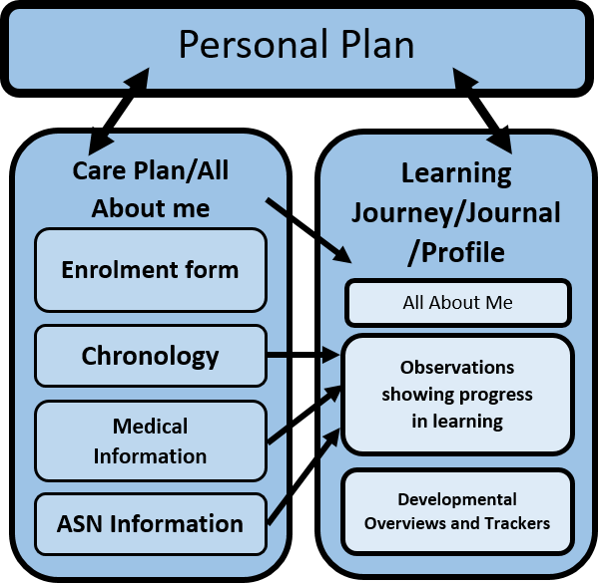Key messages:
- Setting managers must ensure that the storage of personal data and document retention meets the requirements of GDPR. For example, some information in the plan will be stored securely (registration forms) whilst other information will be readily accessible for children to contribute to, e.g. learning journeys.
- Personal Plans reflect the Health and Social Care Standards and their underlying principles of dignity and respect, compassion, being included, responsive care and support and wellbeing.
- The Personal Plan should reflect the uniqueness and individuality of the child.
- Each child should have a Personal Plan that contains all confidential information set up within 28 days of arrival in the setting.
- A personal plan is a requirement only in Early Learning and Childcare settings (ELC).
- This information must be up to date and reflects the current needs, interests and stages of development. The plan is collated using information from the child and their family or carer.
- Personal Plans are reviewed (with parents or carers) and signed at least every six months or whenever a change has been identified (Medication records every three months).
- Parents should be asked to complete a new care plan annually to ensure information has been thoroughly reviewed and is meeting the current needs of the child.
- Practitioners have a shared understanding of the information about a child and use it to ensure that each child is supported to progress and be the best they can be.
- Care Plans, registration documents, chronologies and medication forms should be kept securely.
- All information held on individual children must be shared with parents and carers.
- This information may be used to ensure practitioners are deployed to meet the needs of individual children.
- If children attend more than one ELC provider, information is shared regularly to effectively support the child’s health, wellbeing and progress.
- During periods of transition (horizontal or vertical), there should be a shared professional responsibility for continuity of learning, care, support and challenge, and sharing essential information appropriately and in good time.
- Personal Plans should reflect the principles of GIRFEC and the UNCRC (Care Plan), safeguarding and promoting children’s rights in line with national and international policy and guidelines.
- Personal Plans should record achievement and success, for example: learning journeys.
- Personal plans are a tool for safeguarding, child protection and managing risk.
- Personal plans are regularly audited to ensure they meet the Health and Social Care Standards and the child’s needs.
- Personal Plans should reflect the 5 principles of the Health and Social Care Standards:
-
-
- Dignity and respect
- Compassion
- Be included
- Responsive care and support
- Wellbeing
-
-
(Health and Social Care Standards: My Support, My Life, Scottish Government, 2017, p. 5)
(Guide for Providers on Personal Planning: Early Learning and Childcare, Care Inspectorate, 2021)
Ways we can do this:
GDPR – All practitioners have completed SBLearn GDPR training. Managers can access the National Records of Scotland website or download their guide for additional information and guidance (National Records of Scotland, 2021).
Setting managers have a robust quality assurance calendar to audit personal plans; additional information can be gathered from the Care Inspectorate.
Practitioners use the Quality Improvement Framework for Early Learning and Childcare Sectors (Education Scotland and Care Inspectorate September 2025) to self evaluate against the “Nurturing Care and Support” quality indicator, which includes a personal planning theme (p47).
All practitioners are familiar with the Care Inspectorate Guide For Providers on Personal Planning. Setting managers ensure that personal plans meet the current Health and Social Care Standards and expectations.
The setting has an agreed personal plan format for each child, including Care Plans, chronologies, learning journeys, medication and other proforma. Add dates of reviews and auditing to Quality Assurance Calendar.
Practitioners have an induction program that trains them in the purpose, completion and upkeep of personal plans.
Practitioners are proactive about developing good relationships with parents and carers.
Practitioners ensure that children, parents, and carers are central to creating personal plans by discussing children’s interests, preferences, and needs when writing and reviewing the plan. In addition, other partner agencies should be involved when appropriate.
Personal plans should be well-structured and organised with accessible language and terminology to ensure they are easily accessible and understood by all.
This infographic illustrates the interconnectedness of the different documents which make up the child’s personal plan.


